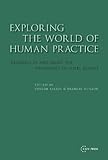Exploring the World of Human Practice : Readings in and about the Philosophy of Aurel Kolnai / ed. by Francis Dunlop, Zoltán Balázs.
Material type: TextPublisher: Budapest ; New York : Central European University Press, [2022]Copyright date: ©2004Description: 1 online resource (354 p.)Content type:
TextPublisher: Budapest ; New York : Central European University Press, [2022]Copyright date: ©2004Description: 1 online resource (354 p.)Content type: - 9786155211102
- 192 22
- B1646.K7774 E96 2005eb
- online - DeGruyter
| Item type | Current library | Call number | URL | Status | Notes | Barcode | |
|---|---|---|---|---|---|---|---|
 eBook
eBook
|
Biblioteca "Angelicum" Pont. Univ. S.Tommaso d'Aquino Nuvola online | online - DeGruyter (Browse shelf(Opens below)) | Online access | Not for loan (Accesso limitato) | Accesso per gli utenti autorizzati / Access for authorized users | (dgr)9786155211102 |
Frontmatter -- Contents -- Preface -- About the Contents of This Volume -- Introduction -- I. PAPERS BY KOLNAI -- What Is Politics About? -- A Note on the Meaning of Right and Wrong -- Erroneous Conscience -- Are There Degrees of Ethical Universality? -- The Concept of Practical Error -- Actions and Inactions -- Agency and Freedom -- The Indispensability of Philosophy -- II. PAPERS ABOUT KOLNAI’S WORK -- 1. Introductory -- Kolnai’s Mature Political Philosophy -- The Ethical Theories of Aurel Kolnai -- 2. Politics and Utopia -- The Democratic Subversion of Political Liberty and Participation -- Liberty, Equality, Nobility: Aurel Kolnai and the Moral Foundations of Democracy -- Aurel Kolnai: A Political Philosopher Confronts the Scourge of Our Epoch -- Aurel Kolnai and Utopia -- 3. Ethics -- Aims in Games and Moral Purposes -- Kolnai and Kant on (Human) Dignity -- Kolnai’s Dissertation Der ethische Wert und die Wirklichkeit: A “Completion” of Scheler’s Value-Ethics -- The Nature and Scope of Ordinary Morality: Some Reflections in the Spirit of Aurel Kolnai -- 4. Feeling and Emotion -- Is Love Intertwined with Hatred? -- Kolnai’s Idea of Emotional Presentation -- Aurel Kolnai’s “Disgust”: A Source in the Art and Writing of Salvador Dalí -- About the Contributors to This Volume -- Indexes
restricted access online access with authorization star
http://purl.org/coar/access_right/c_16ec
Aurel Kolnai was born in Budapest, in 1900 and died in London, in 1973. He was, according to Karl Popper and the late Bernard Williams, one of the most original, provocative, and sensitive philosophers of the twentieth century. Kolnai's moral philosophy is best described in his own words as intrinsicalist, non-naturalist, non-reductionist", which took its original impetus from Scheler's value ethics, and was developed by using a natural phenomenologist method. The unique combination of linguistic analysis and phenomenology yields highly original ideas on classical fields of moral theory, such as responsibility and free will, the meaning of right and wrong, the universalisability of ethical norms, the role of moral emotions, internalism vs externalism, to mention a few. The volume presents a selection of essays by Kolnai, including his main political theoretical work, "What is Politics About", available in English here for the first time. The second half of the book Kolnai's work is analyzed in a series of essays by eminent scholars
Mode of access: Internet via World Wide Web.
In English.
Description based on online resource; title from PDF title page (publisher's Web site, viewed 29. Jul 2022)


